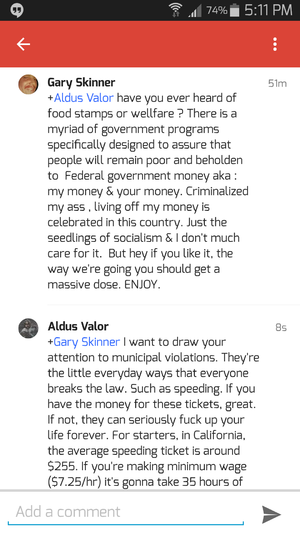Difference between revisions of "Myths/helping people makes them dependent"
(relevant article from reddawg; some reformatting and additional commentary) |
|||
| Line 2: | Line 2: | ||
[[category:social safety net]] | [[category:social safety net]] | ||
[[category:dependency]] | [[category:dependency]] | ||
| + | [[category:poverty]] | ||
==Myth== | ==Myth== | ||
{{hdr/myth|Assisting people in bad situations makes them more dependent, not less.}} | {{hdr/myth|Assisting people in bad situations makes them more dependent, not less.}} | ||
Latest revision as of 16:50, 14 November 2021
Myth
| Myth: Assisting people in bad situations makes them more dependent, not less. |

- 2019-12-28 Don't help the homeless, critics say - it hurts them: "...detractors are engaged in a debate up and down the West Coast as the region struggles to cope with a rising tide of homelessness. They say [...] well-meaning residents who provide the homeless with tents, toilets and hot meals are enabling them to remain unsheltered."
Examples
Look how people have been deceived into becoming dependent upon the government and having the government telling them that they’re going to take care of them from the cradle to the grave. It has destroyed the American dream, destroyed these people’s lives, they no longer strive to better themselves and to provide for their family." ... "I keep going back to how that destroys the American dream, that destroys the incentive for somebody to better themselves [...] and they become serfs of the government, and that just makes them locked into a slavery relationship with the government."[1]
Reality
- Nobody actually wants to be homeless.
- Being homeless is much harder and less pleasant work than having a full-time job which pays enough to live on.
In the United States it is widely believed that public assistance may have harmful effects on the social and political orientations of those who receive it. Certain kinds of government support – particularly welfare – may foster a ‘culture of dependence’...
[...but...]
There is no evidence that a distinctive 'culture of dependence' has developed among people who rely on financial support from the federal government.[2]
It should be noted that US welfare programs tend to have unemployment and/or extreme poverty a precondition of receiving benefits, where benefits are cut off immediately once the thresholds are exceeded. This does indeed provide a disincentive to be employed or to do at all well financially. Such provisions, however, are invariably demanded by those most strongly arguing against welfare in general (typically Republicans), often citing phenomena caused by those specific features as justification.
(This is consistent with the general Republican tendency to wreck public services and then argue that they should be wrecked further because of how terrible they are.)
Further Reading
- Why Republicans Suck: Government Dependence
Footnotes
- ↑ 2015-06-23 Rafael Cruz, father of wingnut Senator Ted Cruz: Rafael Cruz: Aid Recipients 'Locked Into A Slavery Relationship With The Government' (RightWingWatch, via FtB)
- ↑ 2003-04 British Journal of Political Science: A Culture of Dependence? The Relationship Between Public Assistance and Public Opinion